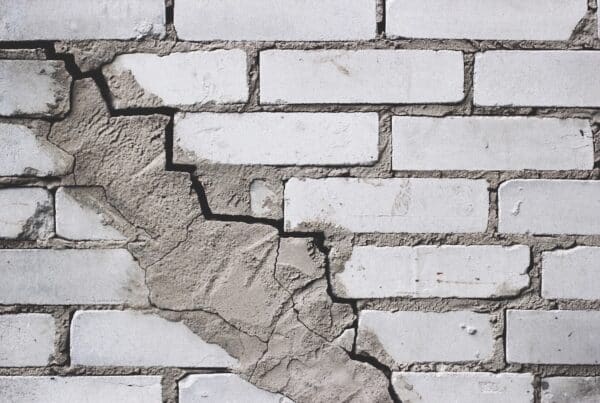Your home’s foundation does more than just hold up walls—it safeguards your entire living space. Over time, though, even the sturdiest foundations can start to show signs of wear. That’s why knowing when and why to schedule an inspection for your home’s foundation is so important.
This post will guide you through key indicators that it’s time for a check, the benefits of staying on top of maintenance, and what to expect from a professional inspection. Whether you’ve noticed some cracks in your walls or are just being proactive, understanding inspection needs for your foundation can make a world of difference.
Signs a Foundation Needs Inspection
Since a solid foundation is a must-have for your home, spotting any warning signs early can save you money and stress later on.
- Cracks in Walls or Floors
- Uneven or Sloping Floors
- Doors and Windows That Stick
- Water Damage or Moisture
- Bowing or Bulging Walls
What may start as small, hairline cracks can indicate much larger issues beneath the surface. Cracks that widen or form a stair-step pattern in brick or concrete walls should raise concern and get expert attention ASAP.
Alternatively, you may notice uneven flooring. This could be more than just an old house settling. Uneven or sloping floors often point to foundation settling or shifting that needs to be addressed quickly!
If doors or windows suddenly start sticking or gaps appear around their frames, your foundation may be shifting. This can occur because the foundation movement distorts the frame, making it harder for them to operate properly. Persistent moisture or water pooling around your home can also erode the soil that supports your foundation, leading to serious structural problems.
Signs of trouble are mold, mildew, or dampness in the basement or crawl space. Finally, walls that appear to bow or bulge inward may be experiencing excessive pressure from outside the foundation. Often, this is due to water buildup or soil movement.

The Risks of Ignoring Foundation Issues
Ignoring foundation issues can lead to far-reaching consequences. The risks become increasingly complex and more costly to resolve, especially as more time passes without action.
More Damage & Pricy Repairs
Foundation issues don’t resolve themselves; they worsen over time. A small crack might seem insignificant, but it can quickly escalate into major structural problems, such as sagging ceilings, misaligned walls, and even sections of your home becoming unstable or collapsing.
The longer you wait, the more extensive and expensive the repairs will be. What could have been a simple fix can turn into a costly project if not addressed promptly.
Lower Home Value
A home with foundation problems is less attractive to potential buyers. Even if you’re not planning to sell right now, unresolved foundation issues can significantly reduce your home’s market value when the time comes.
Buyers are often hesitant to invest in a property with known structural problems, meaning your home could sit on the market longer and sell for less.
Safety Risks
A compromised foundation isn’t just a threat to your home’s structure—it’s a safety hazard. As the foundation deteriorates, the risk of accidents increases, including the potential for falling debris or, in severe cases, partial collapse of your home. Ensuring safety means addressing foundation issues as soon as they’re noticed.
Mold Growth
Cracks in the foundation allow water to seep into your home, leading to moisture issues that can result in mold growth. Mold can spread quickly, damaging your property and posing health risks, especially for those with allergies or respiratory issues. Addressing foundation problems early can help prevent the moisture intrusion that leads to mold.
What to Expect During the Inspection
Visual Assessment
The inspection begins with a thorough visual check of your home’s exterior and interior. The inspector will look for common signs of foundation issues, such as cracks in walls and floors, uneven surfaces, and evidence of water damage. They’ll also evaluate the surrounding property, including drainage and soil conditions, which can impact your foundation’s stability.
In-Depth Assessment
After the initial assessment, the inspector will use specialized tools to delve deeper. Laser levels help measure any shifts in the foundation, moisture meters detect excess water around the foundation, and crack monitors gauge the severity of any cracks. This detailed examination uncovers problems that might not be immediately visible, ensuring a comprehensive understanding of your foundation’s condition.
Detailed Report
Once the inspection is complete, the inspector will compile their findings into a detailed report. This document will highlight any issues, explain their severity, and provide recommendations for repairs or further action. The report typically includes photos and diagrams to help you visualize the condition of your foundation, making the information easier to understand and act upon.
Review and Recommendations
Finally, the inspector will sit down with you to discuss their findings. They’ll explain what they discovered, answer your questions, and offer practical advice on the next steps. Whether your foundation is in good shape or requires repairs, this discussion will give you a clear path forward.

When to Call a Professional
Knowing when to bring in a professional for a foundation inspection can make maintenance and fixes less stressful, expensive, and time-consuming.
- Visible Damage: Cracks in walls or floors, sticking doors or windows, and water damage are all signs that you should call a professional. These issues can indicate underlying foundation problems that need immediate attention.
- After Severe Weather: Events like heavy rain, flooding, or earthquakes can compromise your foundation. If your home has been through such weather, it’s wise to have a professional inspect for potential damage.
- Before Buying or Selling: A foundation inspection is crucial when buying or selling a home. It ensures you’re making a sound investment or addressing any issues that could affect the sale.
- Routine Maintenance: Even if everything seems fine, regular inspections every few years can catch minor issues before they escalate. This is especially important for older homes or properties in areas with challenging soil conditions.
- Before Renovations: Planning significant renovations? Make sure your foundation can handle the changes by getting it inspected first. This prevents future problems and ensures your home remains structurally sound.
Other Recommended Maintenance
Maintaining your foundation is crucial, but it’s just one part of keeping your home in top shape. Here are some additional maintenance tasks that can help protect your home’s structure and prevent future problems:
- Make sure your gutters and downspouts are clear of debris and direct water away from your foundation. Poor drainage can lead to water pooling around your home, which can weaken your foundation over time.
- Regularly check your plumbing for leaks, especially in the basement or crawl space. Even small leaks can cause significant moisture buildup, leading to foundation issues and mold growth.
- Make sure the soil around your home slopes away from the foundation. A simple step like grading can prevent water from collecting near your foundation and reduce the risk of erosion and shifting.
- Keep an eye on trees and shrubs planted near your home. Roots can grow into your foundation and cause cracks or shifts. Trim back any overgrown vegetation to protect your home’s structural integrity.
- Periodically check for new or expanding cracks in your foundation, walls, and floors. Seal any small cracks to prevent them from growing and becoming a bigger issue.
Conclusion
Your home’s foundation is the key to its safety and stability. Regular inspections, prompt repairs, and ongoing maintenance can save you from costly and stressful problems down the road. Whether you’ve noticed signs of damage or just want peace of mind, taking action now is crucial.
Don’t wait until minor issues become major headaches – in Columbus, OH, and surrounding areas, contact Buckeye Basement Solutions today to schedule a professional foundation inspection.



